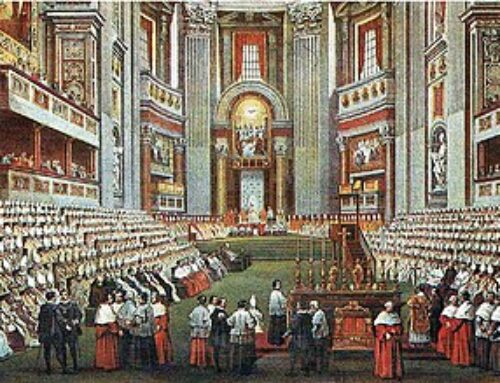
The IRS rules forbid religious groups from direct or indirect involvement in political campaigns or for publicly supporting or opposing “any candidate for public office.” Some church leaders regard this as government pressure to restrict their First Amendment rights. In protest, they led 1600 churches to participate in a 2012 Alliance Defending Freedom Pulpit Freedom Sunday initiative that defied the government’s restriction. A similar initiative is planned for October 5, 2014.
Interestingly, statistics show little support for such initiatives. Bob Smietana points to studies showing that well over 90% of [Christian] parishioners don’t want politics preached from the pulpit and a similar percentage of the clergy don’t want to engage in such preaching.
Given this dilemma, what approach should Catholic pastors take? First, they should distinguish between (a) expressing support of a political party or its candidates and (b) expressing the teachings of the Church on moral issues related to politics and government. The former is political expression proscribed by the IRS; the latter, religious expression guaranteed by the Constitution.
Next, pastors should compose sermons that observe this distinction. By doing so they will not only avoid legal difficulties; they will also avoid incurring the displeasure of the majority of parishioners who don’t want to hear political ads from the pulpit.
Journals devoted to homiletics (preaching) offer guidance in preparing such sermons, and most pastors are familiar with them. For lay readers who are not, I have composed six sample themes based upon Catholic teaching, each of which is supported by the Catechism of the Catholic Church. Where the examples reflect specific passages in the Catechism, I have included the reference numbers.
Sermon Theme: The Church teaches that all humans are tainted by Original Sin and therefore inclined to sin; moreover, human institutions such as government are prone to imperfection. We are therefore not only responsible for doing good and avoiding evil in our own lives, but also (as citizens) to support government policies that honor people’s rights and serve their needs.
Sermon Theme: Alone, good intentions and words count for little; they must be joined by appropriate actions before they can achieve good ends. This is as true for elected officials as it is for ordinary citizens. Therefore, in choosing which candidates to support, we should be concerned not just with how appealing their promises are but, more importantly, how reasonable their promises are and how well they keep them. (Catechism, 2254)
Sermon Theme: Freedom of speech is not only an important right in democratic societies; it also reflects the Catholic teaching that humans are created in “the image and likeness of God” and therefore hold a special place in creation. The best way to show our gratitude for that freedom is to put it to good and responsible use in our social and political discussion and action. (Catechism, 2255)
Sermon Theme: As important as it is for us to respect civil authority and follow its legally established rules, obeying the “demands of the moral order” is more important. And when the two actions are in conflict, our higher obligation is to the latter. In such cases, “We must obey God rather than men.” (Catechism, 2256)
Sermon Theme: The command to put God before all things means, among other things, that we embrace only ideas consistent with our religious faith. This is difficult in politics because parties sometimes change their principles and policies. When that happens, we should be willing to set aside our party affiliation and shift our allegiance, even if long habit and family tradition make doing so difficult.
Sermon Theme: “The seventh commandment enjoins the practice of justice and charity in the administration of earthly goods and the fruits of men’s labor.” (Catechism, 2451) Yet Catholic teaching also affirms individuals’ right to private property and warns that usurping other’s property is unjust, doing so for the sake of gaining power is avaricious, and envying those who are blessed with prosperity is “a capital sin.” (Catechism, 2452-2454, 2552, 2553) We should avoid such offenses ourselves and refuse to tolerate them in our elected officials, even as we champion justice and charity.
Notice that the last example involves an issue about which Catholic teaching is complex. I include that example to illustrate that complex issues need not be avoided in sermons but that the homilist should take special care neither to deny the complexity nor to oversimplify the message.
Many other examples could be cited, all of them demonstrating that pastors need not fear violating the IRS ban on politics in the pulpit if they demonstrate where and how the Church’s teachings are relevant to political issues but avoid propagandizing for a political party or its candidates.
Copyright © 2014 by Vincent Ryan Ruggiero. All rights reserved


